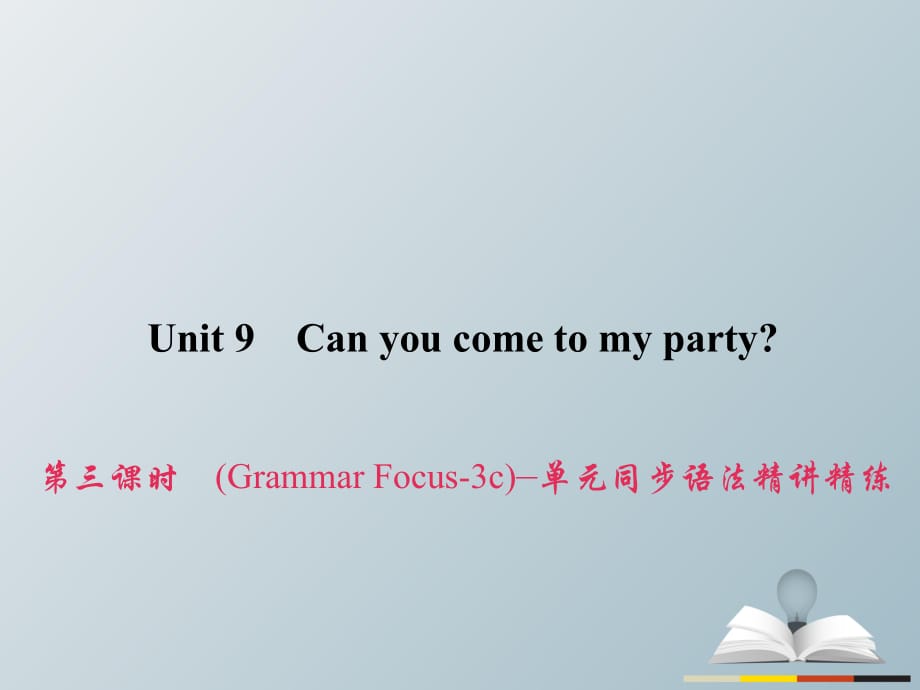《八年級(jí)英語(yǔ)上冊(cè) Unit 9 Can you come to my party(第3課時(shí))(Grammar Focus-3c)同步語(yǔ)法精講精練習(xí)題課件 (新版)人教新目標(biāo)版》由會(huì)員分享�,可在線閱讀,更多相關(guān)《八年級(jí)英語(yǔ)上冊(cè) Unit 9 Can you come to my party(第3課時(shí))(Grammar Focus-3c)同步語(yǔ)法精講精練習(xí)題課件 (新版)人教新目標(biāo)版(9頁(yè)珍藏版)》請(qǐng)?jiān)谘b配圖網(wǎng)上搜索����。
1、Unit 9Can you come to my party?第三課時(shí)(Grammar Focus3c)單元同步語(yǔ)法精講精練 在七年級(jí)下冊(cè)第一單元我們已經(jīng)學(xué)了情態(tài)動(dòng)詞can的相關(guān)用法����,本單元主要學(xué)習(xí)情態(tài)動(dòng)詞can引導(dǎo)的一般疑問(wèn)句及其回答��。can引導(dǎo)的一般疑問(wèn)句需將can放在主語(yǔ)之前�。can表示“做某事的能力”�����,意為“能����;會(huì)”,對(duì)以它開(kāi)頭的一般疑問(wèn)句作肯定回答用“Yes���,主語(yǔ)can.”�,作否定回答用“No���,主語(yǔ)cant.”�����。eg:Can you sing in English��?你會(huì)用英語(yǔ)唱 歌嗎���?Yes��,I can./No,I cant.是的�,我會(huì)。/不�����,我不會(huì)�����。can與第二人稱(chēng)連用���,常用于熟人
2�����、之間表示邀請(qǐng)或請(qǐng)求��,即Can you.? 接受請(qǐng)求或邀請(qǐng)時(shí)����,常用Sure,Id love to./OK�,that sounds great./Certainly./Of course等回答。拒絕邀請(qǐng)�����,一般不直接說(shuō)No�,而應(yīng)說(shuō)(Im)Sorry,I cant.以示禮貌���,然后說(shuō)明理由����;也可用Id love/like to���,but.委婉地說(shuō)明不能接受的原因并表示歉意���。【注意】發(fā)出邀請(qǐng)或請(qǐng)求時(shí)��,也常用could使語(yǔ)氣更委婉���、客氣�。【拓展】can還可以表示推測(cè)�,常用于否定句。eg:That man cant be Mr. Liu because he is in London now.那個(gè)男人不可能是劉
3�����、先生�,因?yàn)樗F(xiàn)在在倫敦�����。 一���、單項(xiàng)選擇�����。1David���,_ you please sweep the floor and take out the trash?OK,Mom.Acould BmayCshould Dmust2Its surprising that Mr. Mas little daughter _ speak English so well.Amust Bcan Cmustnt Dcant3_ you come to my party on Sunday?Sorry�����,Im not available.I _ study for the math test.(易錯(cuò)題)ACan;mu
4����、st BMust;canCNeed�;may DMay;canA BA 4Look����!Here comes your moms car.It _ be hers.She sold her car yesterday.Amust Bcant Cneednt Dmight5Can you come to my party on Wednesday?Sorry,I _I have a piano lesson.Acant Bcouldnt Cmustnt DneedntB A 二���、根據(jù)漢語(yǔ)意思完成下列句子�。6這周末你能和我去看電影嗎��?好的�����,我很樂(lè)意����。_ _ _ _ the movies with me
5、this weekend?Sure����,_ _ _7你能和我一起去購(gòu)物嗎����?我恐怕不行��。我感冒了�����。_ _ go shopping with me?_ _ _I have the flu.Can/Could you go toId love/like toCan/Could youIm afraid not 本課時(shí)其他知識(shí)點(diǎn)精講精練 invite動(dòng)詞���,意為“邀請(qǐng)”,常用于以下結(jié)構(gòu)中:invite sb. sw.邀請(qǐng)某人去某地invite sb. to do sth.邀請(qǐng)某人做某事accept動(dòng)詞�����,意為“接受”�����,強(qiáng)調(diào)主觀上愿意接受�,動(dòng)作者本身是主動(dòng)的?����!就卣埂縭eceive動(dòng)詞,意為“收到”�,強(qiáng)調(diào)客觀收
6、到��,沒(méi)有本身是否愿意接受的意思���。eg:I received his gift����,but I wouldnt like to accept it.我收到了他的禮物�����,但是我不想接受它����。refuse動(dòng)詞,意為“拒絕”�,與accept互為反義詞。refuse to do sth.拒絕做某事refuse sb. sth.拒絕某人某物 refuse sb./sth.拒絕某人/某物 1Sometimes����,I want to _ (拒絕) to do so much work��,but usually I just _ (接受) it.2Kittys teacher Mrs.Xiao invited me _ (join) their school trip to the World Park.3I refuse _ (discuss) this question.refuseaccept to jointo discuss
 八年級(jí)英語(yǔ)上冊(cè) Unit 9 Can you come to my party(第3課時(shí))(Grammar Focus-3c)同步語(yǔ)法精講精練習(xí)題課件 (新版)人教新目標(biāo)版
八年級(jí)英語(yǔ)上冊(cè) Unit 9 Can you come to my party(第3課時(shí))(Grammar Focus-3c)同步語(yǔ)法精講精練習(xí)題課件 (新版)人教新目標(biāo)版

